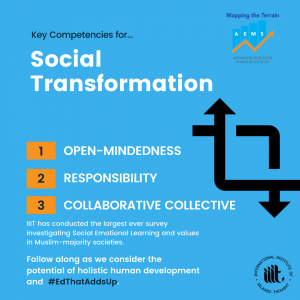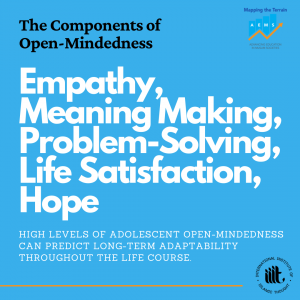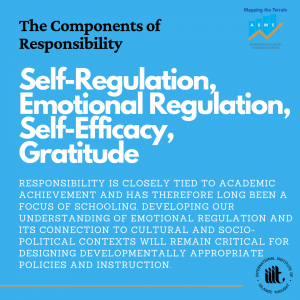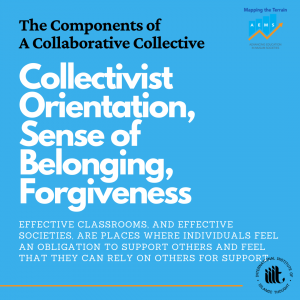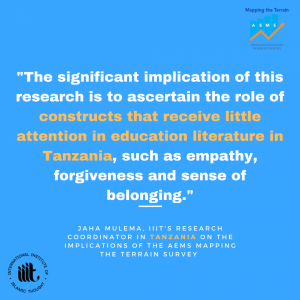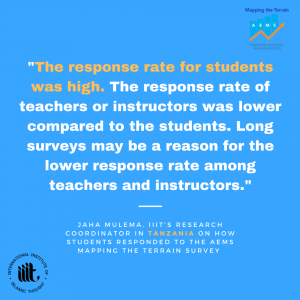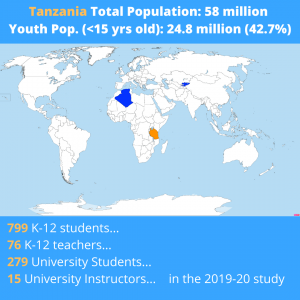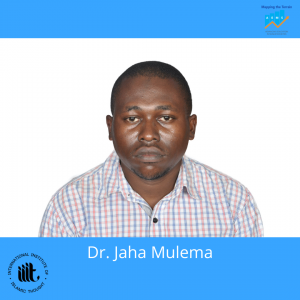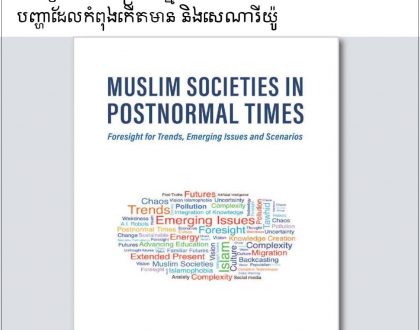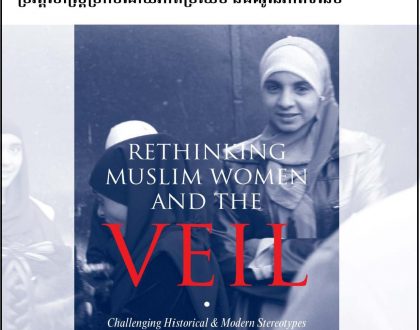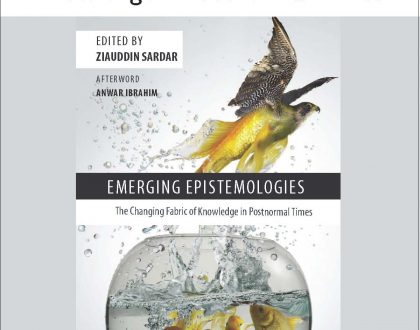AEMS BRIEF #3: ETHICAL VALUES IN HUMAN DEVELOPMENT
Adolescence is a critical stage in human development. It is a time when one’s identity and relation to society begin to take shape. There is, of course, differentiation in this development, but broad patterns have been observed, generalized, and formed into theoretical approaches. Developmental social science has been incorporated into the pedagogical practice and policy of educational systems across the globe to varying degrees. Furthering the integration of developmental research into educational practice is a goal of the AEMS research team. There has also been significant research demonstrating the critical role that cultural and political contexts play in shaping human development. Mapping the Terrain aims to explore and illuminate these contexts and to bring lessons from them to academic and policy arenas.
The Mapping the Terrain report addresses Social Emotional Learning and values in Muslim societies, but the 16 countries surveyed are incredibly culturally, ethnically, and geographically diverse. In order to systematically investigate the varied contexts of adolescent development in these countries, we constructed a values model grounded in theories of social change and tipping point literature. These values were organized based on a review of previous literature and their grouping was hypothesized by the research team. A review of the three umbrella groupings and their implications for human development are summarized below. The sub-measures are based off of standardized measurement scales that can be reviewed more fully in the report.
Open-Mindedness
Our first construct of interest is open-mindedness. This construct is made up of the sub-values and skills of empathy, meaning making, problem-solving, life satisfaction, and hope. Open-mindedness is often seen as a virtue or a value, but it can also be thought of as a skill that can be cultivated by educators. The ability to think things through, to adapt and maneuver in solving problems with critical thinking skills, and to examine all sides and perspectives all contribute to our construct of open-mindedness. Open-mindedness is a very socially constructed skill and is greatly influenced by early exposure to difference. High measures of adolescent open-mindedness can predict long-term adaptability throughout the life course. Given the rapidly changing geopolitical, environmental, and technological realities of modern life, cultivating open-mindedness in young people is a key developmental task for educators.
Responsibility
Responsibility is closely tied to agency, and the idea that individuals are not merely passive creatures controlled by their environment but rather that they have some ability to influence and control their actions. Included under our umbrella category of responsibility are skills and values like self- regulation, emotional regulation, self-efficacy, and gratitude. Responsibility (and in particular the sub-values of self-regulation and self-efficacy) is closely tied to academic achievement and has therefore long been a focus of schooling. Elevating emotional regulation and gratitude to be of comparable concern for educators is part of a larger movement towards holistic education. Emotional regulation is often emphasized in early childhood education, but then neglected from direct instruction as young people grow older. Nevertheless, many of the behavioral and discipline challenges that schools and students face can be traced back to adolescent emotional regulation, and so developing our understanding of emotional regulation and its connection to cultural and political contexts will remain critical for designing developmentally appropriate policies and classrooms.
Collaborative Collective
Our third umbrella category, collaborative collective, was designed specifically for this study. It offers an approach to transformation that stems from the collective nature of Muslim-majority societies but adds collaboration as a necessary condition for the collective to work. It is not the Western notion of cosmopolitanism that, according to some, highlights global interdependence while upholding fundamental personal independence, but rather the collaborative collective construct centers a sense of community and shared values that encourages the interdependence of humanity for the betterment of life for all. Within this category, we identified constructs such as sense of belonging and forgiveness which rely on a deep value system grounded in Islamic teaching, traditions, and the notion of the collective. Effective classrooms, and effective societies, are places where individuals feel an obligation to support others and feel that they can rely on others for support.
And so, What?
If we can raise a generation of young people that are open-minded, that feel a strong sense of personal responsibility, and that believe it is important to be part of a collaborative collective, then we can lay the groundwork for social transformation. Incorporating these values into our educational systems will not come at the expense of traditional academic achievement, but rather these values should contribute to the development of well-rounded, highly capable individuals who can excel both within and beyond strictly academic contexts.
This study provides first-hand evidence of the current state of these values in countries that are often discussed in Western academic settings from a deficit-based perspective. Mapping the Terrain is primary research on Muslim youth by Muslim researchers who are optimistic about the future of these youth and their societies. The focus on holistic educational goals is a global movement, and every part of the globe deserves to be represented in this discourse. Future briefs will discuss in greater detail the policy implications of this work and suggestions for potential uses of our free and open data set by different types of researchers.
As this work continues, we hope that you will engage with us in thinking through the implications of this research. You can do that by responding to this email with any thoughts, by following us on Instagram (@iiit_insta) and Twitter (@iiitfriends), and by forwarding this message to anyone in your life who might find it interesting.
Thank you and all the best,
Alex Koenig,
Non-Resident Fellow in Human Development and Education Policy
The Advancing Education in Muslim Societies (AEMS) Team
The International Institute of Islamic Thought.

